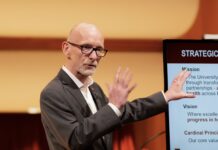They are taking part in the Campus Conservation Nationals, a nationwide competition among college and university campuses to achieve the greatest reduction in electricity and water use.
Students in Psychology 404/571 — Mindfulness and Sustainability — are directing the competition at UofL. Each student is working with a particular residence hall to develop an energy reduction plan. Energy usage in each residence hall will be measured before, during and after the competition to determine the on-campus winner, and those results will be compared with the savings at UK and other schools.
But why should students care and how does mindfulness connect with sustainability?
In Mindfulness and Sustainability, led by psychology professors Barbara Burns and Paul Salmon along with Russ Barnett, director of UofL’s Kentucky Institute for the Environment and Sustainable Development, students have learned to incorporate meditation and mindfulness techniques as a way to increase their awareness of the environment and its connection to human health and well-being.
Mindfulness, explained Salmon, co-director of UofL’s BioBehavioral Laboratory and Mindfulness Studies program, is a “state of alert attentiveness to one’s experience on a moment-by-moment basis, strongly anchored in the present moment.” Mindful awareness can lead to skillful action on behalf of oneself, other residents of the planet and the environment.
Besides meditating, practicing mindfulness techniques and journaling – both in class and at home – the students used their increased awareness to help develop ideas of ways campus residents can reduce energy usage. They started by conducting energy audits of their own homes using energy usage meters. Some of the more surprising facts those audits uncovered included:
- A flat panel TV uses nearly as much energy when it is turned off (if it still is plugged in) as when it is turned on.
- Newer refrigerators use less than half as much energy as older models.
- Cell phone chargers continue to draw electricity even when the phone is fully charged.
Seminar students’ draft plans for the residence hall competition include developing ways to encourage students to turn off lights in their rooms, unplug appliances when not in use and participate in TV-watching parties rather than watch TV alone in their rooms. The hope is that, at the end of the Campus Conservation Nationals, UofL administration will have a host of ideas to draw from to develop a permanent energy reduction plan for the residence halls.
As for the seminar participants: They are connecting thought with action and learning skills that they can take with them into the community now and when they graduate. The need to save energy doesn’t stop in college residence halls. It exists everywhere.


























